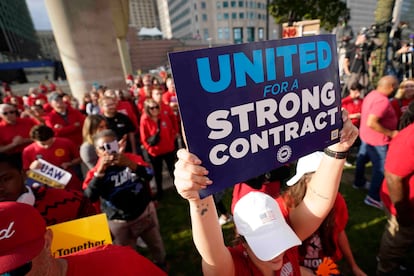UAW strikes at General Motors SUV plant in Texas as union begins to target automakers’ cash cows
The additional plants further escalate a labor dispute that’s in its sixth week and now has about 46,000 union workers off the job

The United Auto Workers union turned up the heat on General Motors as 5,000 workers walked off their jobs Tuesday at a highly profitable SUV factory in Arlington, Texas. The move comes just a day after the union went on strike at a Stellantis pickup truck factory in Sterling Heights, Michigan, north of Detroit.
The additional plants further escalate a labor dispute that’s in its sixth week and now has about 46,000 union workers off the job. And rhetoric from both sides shows that they remain far apart on what they believe are fair wage and benefits offers, with the company and the union hold firmly to their positions.
The addition of the Arlington plant, which makes big truck-based SUVs such as the Chevrolet Tahoe, GMC Yukon and Cadillac Escalade, came just after GM announced strong third-quarter financial results. The SUVs are among GM’s most profitable vehicles. The company on Tuesday posted a net profit of just over $3 billion for the quarter, down 7% from a year ago. But the company reported strong demand and prices for its vehicles.
UAW President Shawn Fain said in a statement that GM beat Wall Street expectations, yet its offer lags behind Ford, preserving a two-tier wage structure and offering the weakest 401(k) contribution of all three companies at 8%. “It’s time GM workers, and the whole working class, get their fair share,” Fain said.
GM CEO Mary Barra said on Tuesday morning’s earnings conference call that the company already has made a record offer and won’t agree to a contract that jeopardizes the company’s future. The union said the move came just hours after GM announced quarterly earnings and four days after Fain said GM’s latest offer wasn’t large enough.
Barra said GM’s record offer rewards employees but doesn’t put the company or UAW jobs at risk. “Accepting unsustainably high costs would put our future and GM team member jobs at risk, and jeopardizing our future is something I will not do,” she said in a statement.
After the Arlington strike was announced, GM said that it’s disappointed in the escalation, calling the strike “unnecessary and irresponsible.” The strike is harming employees and will have “negative ripple effects on our dealers, suppliers, and the communities that rely on us.”
Automakers have made layoffs since the strike began and blamed walkouts for the job cuts. And shares of General Motors Co. are down more than 13% this year, touching lows Tuesday that haven’t been seen since 2020 during the pandemic, when the company’s sales growth tumbled almost 11%. Last week GM made an offer that increased its previous offer by about 25% in total value, the company said.
Thomas Kochan, a professor of work and employment at the Massachusetts Institute of Technology, said the escalation means the negotiations are at a pivotal point. “The pressures for reaching an agreement that everybody can live with are immense on both the company and the union,” he said. “The effects of an expanded strike across the three companies and prolonged over time would be profound, and would have very serious negative effects on the companies and on the workforce.”
The companies, he said, are close to the limits on their offers and the union is close to what it legitimately can expect to get. “There comes a time where the parties have to have very private conversations in negotiations,” Kochan said. “It’s time for the public rhetoric to stop.” He said both sides have to test whether an agreement is possible. “They are professional negotiators and should be able to find the point where both parties can live with a new agreement.”
Sign up for our weekly newsletter to get more English-language news coverage from EL PAÍS USA Edition
Tu suscripción se está usando en otro dispositivo
¿Quieres añadir otro usuario a tu suscripción?
Si continúas leyendo en este dispositivo, no se podrá leer en el otro.
FlechaTu suscripción se está usando en otro dispositivo y solo puedes acceder a EL PAÍS desde un dispositivo a la vez.
Si quieres compartir tu cuenta, cambia tu suscripción a la modalidad Premium, así podrás añadir otro usuario. Cada uno accederá con su propia cuenta de email, lo que os permitirá personalizar vuestra experiencia en EL PAÍS.
¿Tienes una suscripción de empresa? Accede aquí para contratar más cuentas.
En el caso de no saber quién está usando tu cuenta, te recomendamos cambiar tu contraseña aquí.
Si decides continuar compartiendo tu cuenta, este mensaje se mostrará en tu dispositivo y en el de la otra persona que está usando tu cuenta de forma indefinida, afectando a tu experiencia de lectura. Puedes consultar aquí los términos y condiciones de la suscripción digital.








































